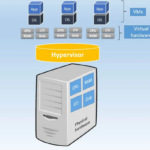In today’s digital landscape, where website traffic can fluctuate unpredictably, it has become essential for businesses to have a hosting solution that not only provides the necessary resources but also offers the flexibility to scale up or down as needed.
A virtual private server (VPS) is often the perfect answer to such demands, offering a blend of dedicated resources with flexible cloud VPS plans that can bridge the gap between underpowered hosting and overpriced dedicated solutions, striking the right balance for optimal performance.
The Evolution of Hosting: From Shared to VPS
The digital landscape has drastically changed how we think about website hosting. There was a time when shared hosting sufficed for the majority of online projects. But as websites grew and the need for more control and resources became apparent, the concept of virtual private servers came into the limelight.
VPS hosting, in essence, offers a sweet spot between the affordability of shared hosting and the robustness of a dedicated server. It provides businesses with flexible cloud VPS plans, allowing them to scale on demand while ensuring that they aren’t paying for unused resources.
Decoding VPS: How It Blends the Best of Dedicated and Shared Resources
Virtual private servers are like having your own slice of a powerful computer. Imagine a pie divided into several pieces where each part operates independently. There’s still a shared physical server, but with VPS, your website lives in an isolated environment with dedicated resources.
This setup prevents what tech folks call the ‘bad neighbor effect’ where one website’s surge in traffic can affect the performance of others on a shared server. With this kind of segregation, businesses experience heightened security, performance and control, giving them a competitive edge.
Why Flexibility in Cloud VPS Plans Caters to Varied Business Needs
Every business is unique, with its own set of technical requirements and growth projections. Flexibility in VPS hosting allows a business to select a plan that aligns closely with its current needs while also leaving room for expansion.
For those experiencing seasonal traffic spikes or those on the brink of scaling operationally, the ability to nimbly adjust resources like CPU, RAM and disk space is pivotal. Additionally, flexible payment plans linked to resource usage enable startups and SMBs to experiment and innovate without breaking the bank.
Enhancing Your Server’s Capabilities With Performance Tuning
Anyone who’s ever run a busy website knows that speed and reliability aren’t just nice to have; they’re essential. Performance tuning within a VPS can take your site from sluggish to sleek, zipping along at a pace that keeps visitors happy and engaged.
This might include configuring server settings for optimal performance or scaling resources on the fly to manage an unexpected surge in website traffic. Plus, the extra control a VPS affords lets you install and update the software stack to meet your specific requirements, ensuring you’re always getting peak performance.
Implementing Robust Security Measures in a VPS Setting
In a time when cyber threats are as common as the weather, a VPS offers heightened security compared to shared hosting environments. Since you’re not sharing your server space directly with other users, there’s a smaller chance of cross-contamination through vulnerabilities in a neighbor’s setup.
By utilizing firewalls, security patches and more sophisticated monitoring tools, you can fortify your little corner of the web against mishaps and malicious attacks, making sure that your data—and that of your users—stays safe and sound.
Key Criteria To Consider When Choosing a VPS Host
Selecting a VPS provider can seem daunting, but focusing on a few core criteria can lead to a wise choice. Look for providers that guarantee uptimes, because, in the world of web hosting, every second your site is down could mean lost revenue or opportunities.
Equally important is the level of customer support. A good provider will offer round-the-clock technical assistance. Don’t overlook the importance of backup and recovery options, either. Accidents happen, and you’ll want to ensure there’s a system in place to swiftly restore your site to its former glory if needed.
Planning a Smooth Migration From Shared to VPS Hosting
Moving from shared hosting to a VPS can be likened to shifting from a cramped apartment to a spacious townhouse. A well-planned migration means less downtime and fewer hiccups. Before taking the plunge, identify compatibility issues and optimize your applications to suit the new environment.
Major players in the hosting field often provide guidance or services to facilitate this transition, making sure that the move is as seamless as possible while maintaining your digital presence without interruption.
Recapping the Strategic Advantages of VPS for Businesses
Flying past shared hosting and touching down into a VPS can be a game-changer for many businesses. You gain control, performance, and above all, versatility. With the right VPS provider, your website can scale to new heights without the cost, complexity and commitment of handling a physical dedicated server.
As VPS technology continues to mature, it promises even greater efficiencies, giving tech-savvy businesses the tools needed to stay agile and competitive in an ever-evolving online marketplace.
In conclusion, VPS hosting offers the performance, security and flexibility that modern businesses need to thrive online. By selecting a provider with flexible cloud VPS plans, companies can ensure that their hosting capabilities can adapt alongside their growth, without incurring excessive costs or sacrificing performance.








